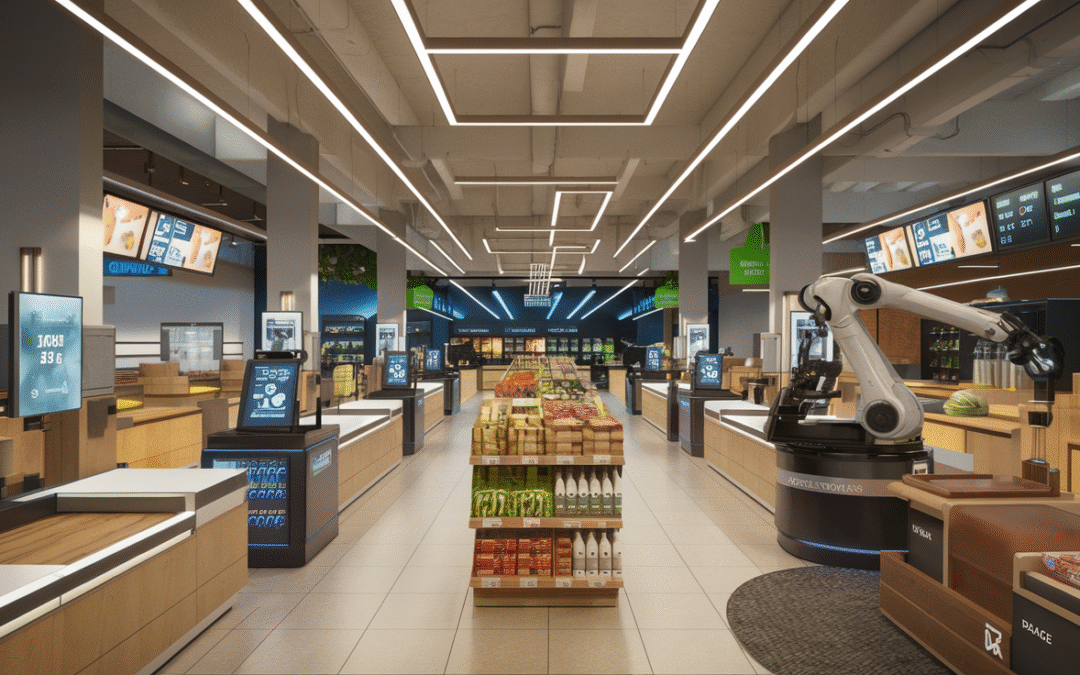Incorporating Smart Technologies in Modern Grocery Stores
In today’s fast-paced retail environment, leveraging smart grocery store technology is essential for staying competitive. From enhancing customer experiences to optimizing operational efficiency, these innovations address key challenges and create new opportunities for grocery retailers. In this article, we’ll explore how iBuild Design and Construction helps property developers and store owners integrate advanced technologies in their grocery store projects across the San Francisco Bay Area, ensuring they remain at the forefront of industry trends.
Table of Contents
- Understanding Smart Grocery Store Technology
- Benefits of Smart Technology in Grocery Stores
- Designing for Technology Integration
- Smart Tech Implementation Stories
- Conclusion
- Partner with iBuild
Understanding Smart Grocery Store Technology
Smart grocery store technology encompasses a wide range of innovations, from automated checkout systems and digital price tags to AI-driven demand forecasting and smart shelving. These technologies streamline operations and offer consumers a seamless shopping experience. For decision-makers and property developers looking to integrate such innovations, understanding the full scope of technology offerings is crucial.
Key Technologies
- Automated Checkout: Reduce long lines and improve customer satisfaction with self-service kiosks and mobile payment options.
- Smart Shelving: Utilize sensors that monitor stock levels, providing real-time inventory updates and reducing out-of-stock situations.
- Digital Price Tags: Ensure price accuracy while reducing the labor required for manual tag updates.
Impact on Store Layout
Integrating these technologies often requires rethinking traditional store layouts. The architect-led design-build approach at iBuild ensures that layouts are optimized to accommodate new technologies without compromising the store’s aesthetics or flow.
Benefits of Smart Technology in Grocery Stores
Incorporating smart technologies provides tangible benefits that go beyond mere convenience. Here’s how these innovations add value:
Enhanced Customer Experience
By offering digital payment solutions and reducing wait times with automated checkouts, grocery stores can significantly enhance the shopping experience. A recent customer survey conducted in a prototype store designed by iBuild showed a 30% increase in satisfaction following the introduction of these technologies.
Operational Efficiency
Smart technologies allow for real-time data collection and analysis, leading to improved inventory management and reduced labor costs. The use of smart shelving has been shown to decrease both overstock and understock scenarios by 20%, optimizing the supply chain process.
Environmental Impact
Digital price tags and automated systems not only save time and resources but also lower the store’s carbon footprint. iBuild’s sustainable design approach ensures that these technologies align with eco-friendly goals, supporting both environmental and business objectives.
Designing for Technology Integration
Successful integration of smart technologies in grocery stores requires a collaborative approach, involving architects, technology providers, and retailers. iBuild Design and Construction’s end-to-end service model is perfectly suited for this task, combining design vision with construction execution.
Site Analysis & Surveys
Before any tech installation, a detailed site analysis ensures that infrastructure supports the intended technologies. iBuild conducts thorough evaluations to inform design decisions, ensuring feasibility and smooth implementation. Learn more about iBuild’s services.
Architectural & Conceptual Design
Designing with technology in mind involves creating adaptable spaces that accommodate future upgrades. Using advanced 3D modeling, iBuild helps clients visualize the integration of smart technologies before construction begins.
Smart Tech Implementation Stories
Real-world success stories highlight the effective deployment of smart technologies in grocery stores. Here are a few fictionalized but realistic scenarios:
Case Study: AI-Driven Demand Forecasting
A San Mateo grocery chain worked with iBuild to implement AI-driven demand forecasting technology. This led to a 15% reduction in spoilage and increased overall profitability by predicting customer buying patterns more accurately.
Case Study: Enhanced Customer Engagement
In collaboration with a Burlingame-based retailer, iBuild deployed a customer engagement app that enabled personalized promotions and real-time updates for shoppers. As a result, the store reported a 25% increase in repeat customer visits.
These examples underscore how smart technologies can be tailored to meet specific business goals while enhancing overall functionality and customer service.
Conclusion
As the retail landscape continues to evolve, incorporating smart grocery store technology is not just a trend, but a necessity. The integration of these innovations offers substantial benefits, from improving operational efficiencies to enhancing customer experiences. By partnering with a seasoned design-build firm like iBuild, grocery store operators can effectively navigate the complexities of technology integration, ensuring a seamless transition and long-term success.
Partner with iBuild
Ready to explore how smart technology can transform your grocery store? iBuild Design and Construction’s architect-led model provides the expertise and comprehensive services needed to bring your vision to life, on time and within budget. Visit our contact page to schedule a consultation and take the first step towards modernizing your retail environment with cutting-edge technology.

